The high-performance random packing market is likely to grow from USD 531.4 million in 2025 to USD 794.1 million by 2035, representing substantial growth, demonstrating the accelerating adoption of advanced packing formulations and premium efficiency technology across chemical processing, petroleum refining, and specialty industrial sectors.
The first half of the decade (2025-2030) will witness the high performance random packing market climbing from USD 531.4 million to approximately USD 649.6 million, adding USD 118.2 million in value, which constitutes 45% of the total forecast growth period. This phase will be characterized by the rapid adoption of ceramic random packing systems, driven by increasing chemical processing capacity and the growing need for mass transfer efficiency requirements worldwide. Advanced material capabilities and flexible design systems will become standard expectations rather than premium options.
The latter half (2030-2035) will witness sustained growth from USD 649.6 million to USD 794.1 million, representing an addition of USD 144.5 million or 55% of the decade's expansion. This period will be defined by mass market penetration of specialized packing designs, integration with comprehensive process optimization platforms, and seamless compatibility with existing distillation and absorption infrastructure. The high performance random packing market market trajectory signals fundamental shifts in how chemical processors approach separation efficiency and operational cost management, with participants positioned to benefit from sustained demand across multiple material types and application segments.
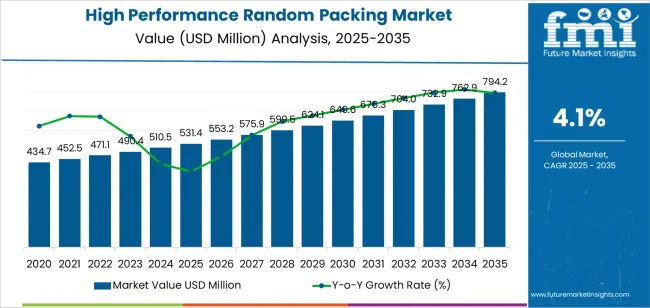
The High Performance Random Packing market demonstrates distinct growth phases with varying market characteristics and competitive dynamics. Between 2025 and 2030, the high performance random packing market market progresses through its efficiency optimization phase, expanding from USD 531.4 million to USD 649.6 million with steady annual increments averaging 4.1% growth. This period showcases the transition from basic packing materials to advanced ceramic-based systems with enhanced mass transfer capabilities and integrated performance optimization systems becoming mainstream features.
The 2025-2030 phase adds USD 118.2 million to market value, representing 45% of total decade expansion. Market maturation factors include standardization of process equipment and chemical industry protocols, declining component costs for specialized packing materials, and increasing industry awareness of efficiency benefits reaching optimal mass transfer effectiveness in chemical and petroleum refining applications. Competitive landscape evolution during this period features established packing manufacturers like Koch-Glitsch and Sulzer expanding their random packing portfolios while specialty manufacturers focus on advanced material development and enhanced performance capabilities.
From 2030 to 2035, market dynamics shift toward advanced material integration and global chemical industry expansion, with growth continuing from USD 649.6 million to USD 794.1 million, adding USD 144.5 million or 55% of total expansion. This phase transition centers on specialized random packing systems, integration with process optimization networks, and deployment across diverse separation and purification scenarios, becoming standard rather than specialized applications. The competitive environment matures with focus shifting from basic packing capability to comprehensive efficiency optimization systems and integration with process control monitoring platforms.
| Metric | Value |
|---|---|
| Market Value (2025) | USD 531.4 million |
| Market Forecast (2035) | USD 794.1 million |
| Growth Rate | 4.1% CAGR |
| Leading Technology | Ceramic Random Packing Material Type |
| Primary Application | Chemical Industry Segment |
The high performance random packing market market demonstrates strong fundamentals with ceramic random packing systems capturing a dominant share through advanced chemical resistance and mass transfer optimization capabilities. Chemical industry applications drive primary demand, supported by increasing process efficiency requirements and separation technology needs. Geographic expansion remains concentrated in developed markets with established chemical processing infrastructure, while emerging economies show accelerating adoption rates driven by industrial expansion and rising efficiency standards.
Market expansion rests on three fundamental shifts driving adoption across the chemical, petroleum, and pharmaceutical processing sectors. First, process efficiency demand creates compelling operational advantages through high performance random packing that provides immediate mass transfer enhancement and energy optimization without compromising separation goals, enabling processors to meet stringent efficiency standards while maintaining throughput productivity and reducing operational costs. Second, chemical industry modernization accelerates as facilities worldwide seek advanced packing systems that complement existing distillation columns, enabling precise separation optimization and process control that align with industry standards and environmental regulations.
Third, environmental compliance enhancement drives adoption from petroleum refiners and chemical processors requiring effective separation solutions that maximize product purity while maintaining operational productivity during distillation and absorption operations. However, growth faces headwinds from material cost challenges that vary across packing suppliers regarding the sourcing of specialty ceramics and advanced alloys, which may limit adoption in cost-sensitive operations. Technical limitations also persist regarding fouling susceptibility and pressure drop concerns that may reduce effectiveness in contaminated feedstock and high-viscosity conditions, which affect separation performance and maintenance requirements.
The high performance random packing market represents a specialized yet critical process equipment opportunity driven by expanding global chemical production, refinery modernization, and the need for superior separation performance in diverse industrial applications. As processors worldwide seek to achieve optimal mass transfer efficiency, reduce energy consumption, and integrate advanced packing systems with existing platforms, high performance random packing is evolving from basic tower internals to sophisticated separation solutions ensuring operational excellence and efficiency leadership.
The high performance random packing market's growth trajectory from USD 531.4 million in 2025 to USD 794.1 million by 2035 at a 4.1% CAGR reflects fundamental shifts in chemical industry efficiency requirements and process optimization. Geographic expansion opportunities are particularly pronounced in Asia Pacific markets, while the dominance of ceramic packing systems and chemical industry applications provides clear strategic focus areas.
Strengthening the dominant ceramic segment through enhanced material formulations, superior chemical resistance, and optimized geometric designs. This pathway focuses on optimizing packing structure, improving mass transfer efficiency, extending operational effectiveness to optimal separation rates, and developing specialized formulations for diverse applications. Market leadership consolidation through advanced ceramic engineering and performance optimization enables premium positioning while defending competitive advantages against metallic alternatives. Expected revenue pool: USD 32-45 million
Rapid chemical manufacturing and refinery growth across Asia Pacific creates substantial expansion opportunities through local production capabilities and technology transfer partnerships. Growing petrochemical capacity and industrial modernization initiatives drive sustained demand for advanced random packing systems. Localization strategies reduce import costs, enable faster technical support, and position companies advantageously for procurement programs while accessing growing domestic markets. Expected revenue pool: USD 26-38 million
Expansion within the dominant chemical industry segment through specialized packing designs addressing separation standards and high-capacity column requirements. This pathway encompasses distillation tower systems, absorption column integration, and compatibility with diverse chemical processing operations. Premium positioning reflects superior mass transfer performance and comprehensive process efficiency supporting modern chemical manufacturing. Expected revenue pool: USD 22-32 million
Strategic expansion into petroleum and natural gas applications requires enhanced hydrocarbon compatibility and specialized packing addressing refinery operational requirements. This pathway addresses high-temperature performance, corrosion resistance enhancement, and heavy-duty systems with advanced material engineering for demanding refinery standards. Premium pricing reflects specialized performance requirements and extended operational life. Expected revenue pool: USD 18-27 million
Development of specialized metallic random packing formulations and plastic systems, addressing specific weight requirements and corrosion demands. This pathway encompasses lightweight designs, cost-optimized materials, and versatile alternatives for diverse process segments. Technology differentiation through proprietary geometries enables diversified revenue streams while reducing dependency on single material platforms. Expected revenue pool: USD 15-23 million
Expansion of food and beverage application segment through enhanced food-grade materials, superior sanitary properties, and specialized processing requirements. This pathway encompasses distillation applications, extraction systems, and specialty equipment requiring food-safe characteristics. Market development through hygienic design engineering enables differentiated positioning while accessing food processing markets requiring specialized separation solutions. Expected revenue pool: USD 12-19 million
Development of pharmaceutical industry and water treatment applications addressing quality standards and purification requirements across drug manufacturing and environmental scenarios. This pathway encompasses cleanroom-compatible packing, validation-ready systems, and comprehensive regulatory documentation. Market positioning reflects application expertise and compliance capabilities while enabling access to pharmaceutical sector programs and water treatment partnerships. Expected revenue pool: USD 10-16 million
Primary Classification: The market segments by material type into Ceramic Random Packing, Metallic Random Packing, Plastic Random Packing, and Carbon Random Packing categories, representing the evolution from basic packing materials to specialized performance solutions for comprehensive separation optimization.
Secondary Classification: Application segmentation divides the high performance random packing market into Chemical Industry, Petroleum and Natural Gas, Food and Beverage Industry, Pharmaceutical Industry, Water Treatment Industry, and Other sectors, reflecting distinct requirements for chemical resistance, temperature capability, and mass transfer performance.
Regional Classification: Geographic distribution covers Asia Pacific, Europe, North America, and other regions, with developed markets leading adoption while emerging economies show accelerating growth patterns driven by chemical industry expansion programs.
The segmentation structure reveals technology progression from standard random packing materials toward specialized high-performance systems with enhanced efficiency and durability capabilities, while application diversity spans from chemical processing to specialized pharmaceutical and water treatment applications requiring precise separation solutions.
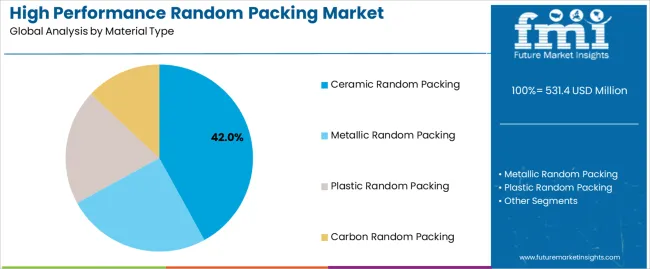
Market Position: Ceramic random packing systems command the leading position in the High Performance Random Packing market with approximately 42% market share through superior material properties, including exceptional chemical resistance capability, high-temperature stability, and mass transfer efficiency that enable processors to achieve optimal separation performance across diverse chemical and industrial environments.
Value Drivers: The segment benefits from processor preference for durable packing materials that provide consistent separation performance, extended operational life, and chemical compatibility without requiring frequent replacement. Advanced material features enable corrosive service applications, high-temperature operations, and integration with existing column internals, where chemical resistance and thermal stability represent critical operational requirements.
Competitive Advantages: Ceramic random packing systems differentiate through proven corrosion resistance, consistent mass transfer characteristics, and integration with chemical processing columns that enhance separation efficiency while maintaining optimal pressure drop characteristics suitable for diverse distillation, absorption, and stripping applications. The segment's dominance is reinforced by comprehensive industry validation across major chemical processors and refineries, established manufacturing infrastructure supporting global supply networks, and continuous innovation in ceramic formulations that addresses evolving process requirements and efficiency standards.
Key market characteristics:
Metallic random packing systems maintain significant market positioning in the High Performance Random Packing market with approximately 28.0% market share due to their structural strength properties and high-capacity advantages. These systems appeal to processors requiring robust packing with superior mechanical performance for high-throughput applications. Market adoption is driven by refinery expansion, highlighting reliable separation solutions and operational capacity through optimized metallic formulations while maintaining competitive performance-to-cost ratios.
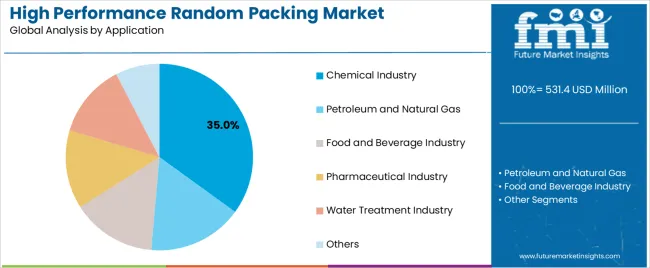
Market Context: Chemical industry applications dominate the High Performance Random Packing market with approximately 35% market share due to widespread adoption of separation technology and increasing focus on process efficiency, product purity optimization, and energy conservation applications that minimize operational costs while maintaining industry standards.
Appeal Factors: Chemical processors prioritize packing performance, chemical compatibility, and integration with existing distillation infrastructure that enables coordinated separation operations across multiple process columns. The segment benefits from substantial chemical industry investment and efficiency programs that emphasize the acquisition of random packing for mass transfer optimization and energy reduction applications.
Growth Drivers: Chemical capacity expansion programs incorporate high performance random packing as standard column internals for modern processing operations, while environmental regulation growth increases demand for efficient separation capabilities that comply with emission standards and optimize resource utilization. The growing emphasis on sustainable chemical manufacturing is driving demand for advanced random packing systems that reduce energy consumption across diverse separation processes, while increasing product quality requirements necessitate processors to implement high-efficiency packing to support purification enhancement and specification compliance throughout the production process.
Market Challenges: Varying process conditions and feedstock characteristics may limit packing standardization across different chemical facilities or product streams.
Application dynamics include:
Petroleum and natural gas applications capture approximately 27.0% market share through specialized separation requirements in refinery operations, gas processing facilities, and hydrocarbon purification scenarios demanding reliable random packing systems capable of maintaining performance under severe service conditions while providing exceptional mass transfer efficiency and product quality enhancement.
Food and beverage industry accounts for approximately 15.0% market share through sanitary processing requirements and extraction applications, pharmaceutical industry captures 12.0% through purification needs and quality standards, water treatment represents 8.0% through environmental applications, while other segments constitute 3.0% including mining, power generation, and general industrial applications requiring random packing capabilities for diverse separation and process compliance.
Growth Accelerators: Chemical capacity expansion drives primary adoption as high performance random packing provides superior mass transfer capabilities that enable processors to meet efficiency standards without excessive energy costs, supporting operational goals and environmental missions that require optimal separation applications. Process modernization demand accelerates market expansion as industries seek effective packing systems that optimize column performance while maintaining operational effectiveness during distillation and absorption scenarios. Industrial sector spending increases worldwide, creating sustained demand for advanced random packing systems that complement existing process equipment and provide efficiency gains in competitive markets.
Growth Inhibitors: Material cost challenges vary across packing suppliers regarding the sourcing of specialty ceramics and advanced metallic alloys, which may limit operational flexibility and market penetration in regions with volatile raw material prices or cost-sensitive processing operations. Technical performance limitations persist regarding fouling susceptibility and mechanical fragility that may reduce effectiveness in contaminated service, particulate-laden streams, or high-velocity conditions, affecting packing performance and maintenance requirements. Market fragmentation across multiple column designs and process specifications creates compatibility concerns between different packing suppliers and existing tower infrastructure.
Market Evolution Patterns: Adoption accelerates in chemical processing and refinery sectors where separation efficiency justifies packing investment costs, with geographic concentration in developed markets transitioning toward mainstream adoption in emerging economies driven by industrial expansion and efficiency awareness. Technology development focuses on enhanced packing geometries, improved surface treatments, and compatibility with fouling-resistant designs that optimize mass transfer performance and operational reliability. The high performance random packing market could face disruption if alternative separation technologies or structured packing innovations significantly limit the deployment of random packing in chemical applications, though random packing's unique combination of cost-effectiveness, installation simplicity, and proven performance continues to make it essential in industrial separation processes.
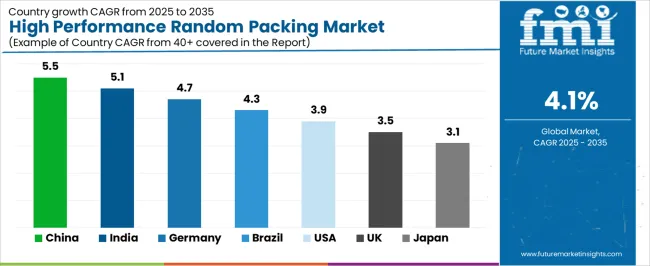
The High Performance Random Packing market demonstrates varied regional dynamics with Growth Leaders including China (5.5% CAGR) and India (5.1% CAGR) driving expansion through chemical capacity additions and refinery modernization programs. Steady Performers encompass Germany (4.7% CAGR), Brazil (4.3% CAGR), and United States (3.9% CAGR), benefiting from established chemical industries and advanced process technology adoption. Mature Markets feature United Kingdom (3.5% CAGR) and Japan (3.1% CAGR), where specialized processing applications and premium packing integration support consistent growth patterns.
| Country | CAGR (2025-2035) |
|---|---|
| China | 5.5% |
| India | 5.1% |
| Germany | 4.7% |
| Brazil | 4.3% |
| United States | 3.9% |
| United Kingdom | 3.5% |
| Japan | 3.1% |
Regional synthesis reveals Asia Pacific markets leading adoption through chemical manufacturing expansion and refinery infrastructure development, while European countries maintain steady expansion supported by advanced process technology advancement and environmental standardization requirements. North American markets show moderate growth driven by shale gas processing applications and chemical plant modernization trends.
The Chinese market emphasizes advanced separation features, including high-efficiency designs and integration with comprehensive chemical processing platforms that manage mass transfer optimization, column performance, and efficiency applications through unified process systems. The country demonstrates strong growth at 5.5% CAGR, driven by petrochemical capacity expansion, refinery modernization initiatives, and emerging chemical industry development that support random packing integration. Chinese processors prioritize operational effectiveness with high performance random packing delivering consistent separation performance through advanced geometric designs and material adaptation features.
Technology deployment channels include major chemical complexes, refinery facilities, and industrial equipment procurement programs that support professional applications for complex distillation columns and absorption tower operations. Process platform integration capabilities with established chemical systems expand market appeal across diverse operational requirements seeking efficiency and performance benefits. The expanding petrochemical sector and accelerating chemical industry growth create sustained demand, while innovative applications in coal chemical processing and environmental treatment open new growth avenues.
Performance Metrics:
Germany's advanced chemical industry demonstrates sophisticated random packing deployment with documented operational effectiveness in chemical processing applications and pharmaceutical facilities through integration with existing distillation systems and process infrastructure. The country leverages engineering expertise in separation technology and process systems integration to maintain strong growth at 4.7% CAGR. Industrial centers, including Frankfurt, Munich, and Hamburg, showcase premium installations where random packing systems integrate with comprehensive process platforms and efficiency management systems to optimize separation performance and operational effectiveness.
German processors prioritize system efficiency and EU compliance in packing selection, creating demand for premium random packing systems with superior features, including optimized geometries and advanced material formulations. The high performance random packing market benefits from established chemical manufacturing infrastructure and a willingness to invest in separation technologies that provide long-term operational benefits and compliance with international environmental and safety standards.
Market Intelligence Brief:
The USA high performance random packing market demonstrates sophisticated deployment across chemical and refinery applications with documented effectiveness in petrochemical processing and natural gas treatment through integration with comprehensive separation systems and efficiency optimization infrastructure. The country leverages advanced manufacturing capabilities in packing innovation and process optimization technologies to maintain moderate growth at 3.9% CAGR. Industrial centers, including Houston, Baton Rouge, and Corpus Christi, showcase extensive installations where random packing systems integrate with comprehensive process platforms and refinery networks to optimize operational efficiency and separation effectiveness.
American processors prioritize separation performance and operational reliability in packing selection, creating demand for innovative random packing systems with advanced features, including low-pressure-drop designs and high-capacity formulations. The high performance random packing market benefits from established chemical manufacturing infrastructure and willingness to invest in process technologies that provide long-term efficiency benefits and compliance with EPA and operational standards.
Market Intelligence Brief:
The UK high performance random packing market demonstrates advanced efficiency deployment with documented operational effectiveness in chemical processing applications and pharmaceutical facilities through integration with existing process compliance systems and operational infrastructure. The country leverages regulatory expertise in separation technology and process systems integration to maintain steady growth at 3.5% CAGR. Industrial centers, including London, Manchester, and Teesside, showcase installations where random packing systems integrate with comprehensive efficiency platforms and process management systems to optimize regulatory compliance and separation effectiveness.
British processors prioritize system efficiency and regulatory compliance in packing selection, creating demand for certified random packing systems with advanced features, including validated performance data and environmental compatibility. The high performance random packing market benefits from established chemical manufacturing infrastructure and commitment to invest in separation technologies that provide long-term operational benefits and compliance with UK and EU process safety standards. Chemical processing applications, pharmaceutical manufacturing systems, and environmental treatment programs drive diversified demand across multiple industrial segments.
Strategic Market Indicators:
India's high performance random packing market demonstrates rapid expansion deployment with documented operational effectiveness in chemical processing applications and refinery facilities through integration with emerging process systems and industrial infrastructure. The country leverages growing industrial capabilities in chemical processing technology and separation systems integration to achieve high growth at 5.1% CAGR. Industrial centers, including Mumbai, Gujarat, and Chennai, showcase expanding installations where random packing systems integrate with comprehensive chemical platforms and refinery networks to optimize market penetration and operational effectiveness.
Indian processors prioritize cost-effectiveness and operational performance in packing selection, creating demand for versatile random packing systems with competitive features, including proven designs and reliable performance. The high performance random packing market benefits from expanding chemical manufacturing infrastructure and willingness to invest in separation technology that provides efficiency benefits and compliance with emerging environmental standards.
Market Intelligence Brief:
Brazil's high performance random packing market demonstrates strong deployment with documented operational effectiveness in petrochemical applications and bioethanol facilities through integration with established refinery systems and renewable fuel infrastructure. The country leverages natural resource capabilities in petroleum processing and biofuel production to achieve robust growth at 4.3% CAGR. Industrial centers, including São Paulo, Rio de Janeiro, and Santos, showcase significant installations where random packing systems integrate with comprehensive process platforms and refinery operations to optimize separation efficiency and operational effectiveness.
Brazilian processors prioritize operational reliability and local content in packing selection, creating demand for regionally-manufactured random packing systems with competitive features and proven performance. The high performance random packing market benefits from established petrochemical infrastructure and renewable fuel emphasis that provides sustained demand for separation technology.
Market Intelligence Brief:
Japan's high performance random packing market demonstrates precision deployment with documented operational effectiveness in chemical processing applications and specialty manufacturing facilities through integration with advanced process systems and quality control infrastructure. The country leverages engineering excellence in precision separation technology and process systems integration to maintain steady growth at 3.1% CAGR. Industrial centers, including Tokyo, Osaka, and Yokohama, showcase premium installations where random packing systems integrate with comprehensive quality platforms and process monitoring systems to optimize operational excellence and separation effectiveness.
Japanese processors prioritize system precision and operational reliability in packing selection, creating demand for premium random packing systems with advanced features, including precise manufacturing tolerances and quality integration systems. The high performance random packing market benefits from established chemical manufacturing infrastructure and commitment to invest in highest-quality separation equipment that provides superior operational efficiency and compliance with stringent Japanese process standards.
Strategic Market Indicators:
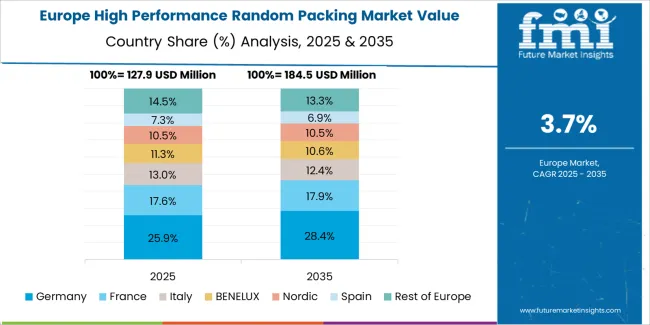
The High Performance Random Packing market in Europe is projected to grow substantially over the forecast period, with Germany expected to maintain its leadership position with a significant market share supported by its advanced chemical manufacturing infrastructure and major petrochemical centers in Frankfurt and Munich. France follows with strong market presence, driven by comprehensive refinery programs and chemical processing initiatives. The United Kingdom holds substantial market share through specialized pharmaceutical processing activities, chemical manufacturing applications, and environmental treatment operations. Italy commands notable market presence through strong chemical processing and refinery projects. Spain accounts for growing market share aided by chemical manufacturing expansion and process modernization adoption. The Netherlands maintains steady share driven by specialty chemical applications and petrochemical demand. The Rest of Europe region is anticipated to show steady adoption, reflecting consistent growth in Nordic countries, chemical industry expansion in Central European markets, and separation technology upgrades across Eastern European processing facilities.
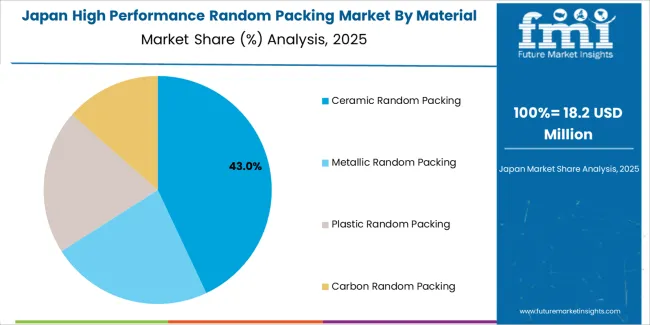
In Japan, the High Performance Random Packing market prioritizes ceramic random packing systems, which capture the dominant share of chemical processing and pharmaceutical installations due to their advanced features, including superior chemical resistance optimization and seamless integration with existing distillation column infrastructure. Japanese processors emphasize durability, performance, and long-term operational excellence, creating demand for ceramic random packing systems that provide consistent separation capabilities and superior corrosion resistance based on process requirements and quality standards. Metallic random packing maintains secondary positions primarily in high-capacity applications and temperature-critical installations where comprehensive mechanical strength meets operational requirements without compromising separation efficiency.
Market Characteristics:
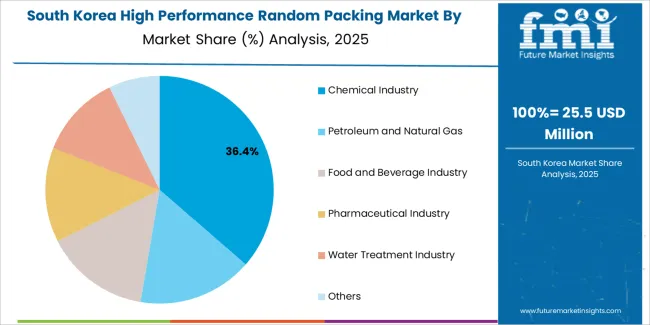
In South Korea, the high performance random packing market structure favors international process equipment manufacturers, including Koch-Glitsch, Sulzer, and Raschig GmbH, which maintain dominant positions through comprehensive product portfolios and established chemical industry networks supporting both petrochemical processing and specialty chemical installations. These providers offer integrated solutions combining advanced random packing systems with professional engineering services and ongoing technical support that appeal to Korean processors seeking reliable separation technology. Local equipment distributors and engineering firms capture moderate market share by providing localized support capabilities and competitive pricing for standard packing installations, while domestic manufacturers focus on specialized applications and cost-effective solutions tailored to Korean chemical market characteristics.
Channel Insights:
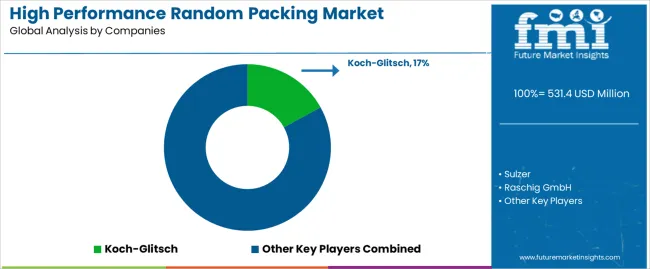
The High Performance Random Packing market operates with moderate-to-high concentration, featuring approximately 10-15 meaningful participants, where leading companies control roughly 55-60% of the global market share through established chemical industry relationships and comprehensive packing portfolios. Competition emphasizes technical performance, material innovation, and engineering support strength rather than price-based rivalry. The leading company, Koch-Glitsch, commands significant market presence through its extensive random packing product line and global chemical industry integration.
Market Leaders encompass Koch-Glitsch, Sulzer, and Raschig GmbH, which maintain competitive advantages through extensive mass transfer expertise, global engineering networks, and comprehensive process integration capabilities that create customer loyalty and support premium pricing. These companies leverage decades of separation technology experience and ongoing innovation investments to develop advanced random packing systems with performance optimization and reliability features. Technology Innovators include Pall Ring and Tri-Mer, which compete through specialized packing geometry focus and innovative material capabilities that appeal to processors seeking advanced separation solutions and efficiency enhancement.
These companies differentiate through rapid technology development cycles and specialized application focus. Regional Specialists feature packing manufacturers focusing on specific geographic markets and specialized applications, including custom-designed systems and integrated process solutions. Market dynamics favor participants that combine proven packing performance with advanced engineering capabilities, including CFD modeling support and automatic performance optimization features. Competitive pressure intensifies as traditional packing suppliers expand into high-efficiency designs, while process technology companies challenge established players through innovative geometry solutions and advanced material platforms targeting chemical processing and refinery segments.
| Item | Value |
|---|---|
| Quantitative Units | USD 531.4 million |
| Material Type | Ceramic Random Packing, Metallic Random Packing, Plastic Random Packing, Carbon Random Packing |
| Application | Chemical Industry, Petroleum and Natural Gas, Food and Beverage Industry, Pharmaceutical Industry, Water Treatment Industry, Others |
| Regions Covered | Asia Pacific, Europe, North America, Latin America, Middle East & Africa |
| Countries Covered | China, India, Germany, Brazil, United States, United Kingdom, Japan, and 20+ additional countries |
| Key Companies Profiled | Koch-Glitsch, Sulzer, Raschig GmbH, Pall Ring, Tri-Mer, RVT, ENVIMAC, MTE Group, M Chemical, MACH Engineering, Boegger, Matsui Machine Ltd, Boedon, AMTA, Ablaze |
| Additional Attributes | Dollar sales by material type and application categories, regional adoption trends across Asia Pacific, Europe, and North America, competitive landscape with process equipment manufacturers and packing suppliers, processor preferences for mass transfer efficiency and chemical resistance, integration with distillation column platforms and process control systems, innovations in packing geometry and material excellence, and development of high-capacity solutions with enhanced separation performance and operational optimization capabilities. |
The global high performance random packing market is estimated to be valued at USD 531.4 million in 2025.
The market size for the high performance random packing market is projected to reach USD 794.2 million by 2035.
The high performance random packing market is expected to grow at a 4.1% CAGR between 2025 and 2035.
The key product types in high performance random packing market are ceramic random packing, metallic random packing, plastic random packing and carbon random packing.
In terms of application, chemical industry segment to command 35.0% share in the high performance random packing market in 2025.






Full Research Suite comprises of:
Market outlook & trends analysis
Interviews & case studies
Strategic recommendations
Vendor profiles & capabilities analysis
5-year forecasts
8 regions and 60+ country-level data splits
Market segment data splits
12 months of continuous data updates
DELIVERED AS:
PDF EXCEL ONLINE
High Voltage Equipment Market Forecast and Outlook 2025 to 2035
High Clear Film Market Size and Share Forecast Outlook 2025 to 2035
High Precision Microfluidic Pump Market Size and Share Forecast Outlook 2025 to 2035
High Temperature Heat Pump Dryers Market Size and Share Forecast Outlook 2025 to 2035
High Temperature Fiberglass Filter Media Market Size and Share Forecast Outlook 2025 to 2035
High Purity Tungsten Hexachloride Market Size and Share Forecast Outlook 2025 to 2035
High Purity Nano Aluminum Oxide Powder Market Size and Share Forecast Outlook 2025 to 2035
High Mast Lighting Market Forecast and Outlook 2025 to 2035
High-Protein Pudding Market Forecast and Outlook 2025 to 2035
High Voltage Ceramic Zinc Oxide Surge Arrester Market Size and Share Forecast Outlook 2025 to 2035
High-Power Microwave Source Market Size and Share Forecast Outlook 2025 to 2035
High Molecular Ammonium Polyphosphate Market Size and Share Forecast Outlook 2025 to 2035
High Throughput Screening Market Size and Share Forecast Outlook 2025 to 2035
High Barrier Packaging Films for Pharmaceuticals Market Size and Share Forecast Outlook 2025 to 2035
High Barrier Packaging Films Market Size and Share Forecast Outlook 2025 to 2035
High Purity Carbonyl Iron Powder (CIP) Market Size and Share Forecast Outlook 2025 to 2035
High Voltage PTC Heater Market Size and Share Forecast Outlook 2025 to 2035
High Temperature Grease Market Size and Share Forecast Outlook 2025 to 2035
High Frequency Chest-Wall Oscillation Devices Market Size and Share Forecast Outlook 2025 to 2035
High-purity Fluoropolymer Valves Market Size and Share Forecast Outlook 2025 to 2035

Thank you!
You will receive an email from our Business Development Manager. Please be sure to check your SPAM/JUNK folder too.
Chat With
MaRIA